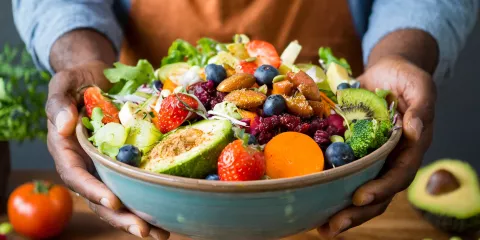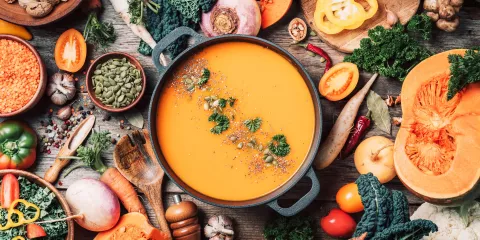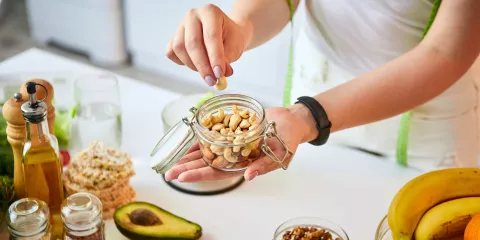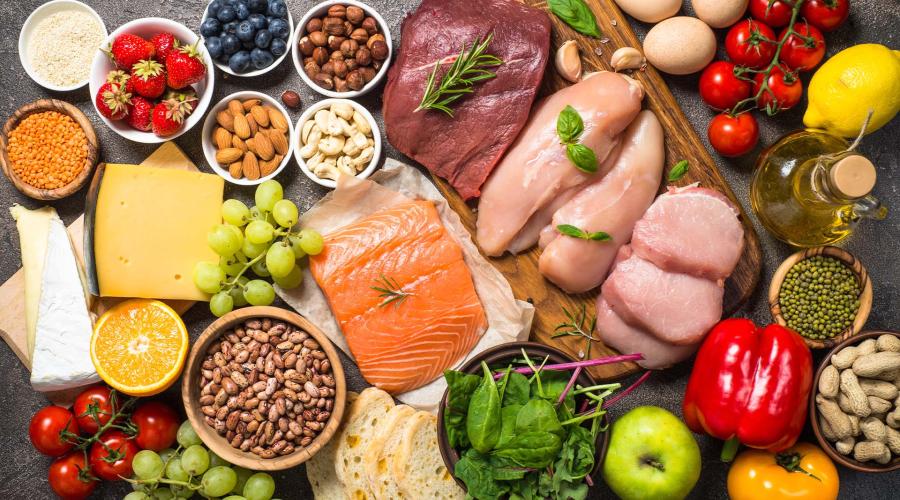
Meal Plan Created By: Amanda Kostro Miller
Did you know that May is Arthritis Month? In America, around 24% of all adults experience some form of arthritis, according to the Center for Disease Control.1 You might be surprised that what you eat every day can have an impact on arthritic pain, too. At Kaneka, we want to support you in your journey to improve your overall health—and your heart health—by offering up 12 months of healthy eating, featuring uniquely targeted meal plans created by a registered dietician.
ICYMI: 12 Months of Healthy Eating: Antioxidant Boost
This month, our meal plan features foods which have anti-inflammatory properties. Incorporating anti-inflammatory foods into your diet, especially green leafy and dark yellow vegetables, fruits, and whole grains, can have important overall health benefits. Not only can these types of diets reduce the risk of cardiovascular disease,2 they also can help reduce conditions associated with IBS, and benefit people with arthritis. Learn how you can benefit from building anti-inflammatory foods into your healthy meal planning. Check out our 7-day anti-inflammatory meal plan now!
Download The Printable Meal Plan
Is an Anti-Inflammatory Diet Good For Arthritis?
Inflammation is one of the most annoying triggers of arthritis, so being mindful of how you eat, and focusing on consuming foods which are known to decrease inflammation may help reduce the pain associated with arthritis. In fact, Arthritis.org declares the Mediterranean Diet as “The Ultimate Arthritis Diet,” thanks to its anti-inflammatory properties.3 Anti-inflammatory diets may also reduce the risk of and help manage conditions like heart disease and diabetes that people with arthritis are more likely to develop.4 Needless to say, eating foods which reduce inflammation has a whole host of benefits, but is especially important for those who suffer from arthritis.
Which Foods Are Anti-Inflammatory?
There are a lot of delicious and nutrient-rich foods which also have anti-inflammatory properties. The Mediterranean diet contains a lot of anti-inflammatory foods, like nuts, fruits, fish, whole grains, healthy oils, and vegetables, but incorporating any of these healthy foods into your diet can help reduce inflammation.5 Especially important are green leafy vegetables, like spinach, and whole grain carbohydrates. On an anti-inflammatory diet, you should focus on snacking on colorful veggies, and fruits like cherries, oranges, or blueberries, rather than reaching for a bag of potato chips or a slice of salami. In almost all cases, you’ll want to switch out butter and lard for leaner, more healthy oils like olive oil or sunflower seed oil, and avoid processed foods as much as possible across the board. Last but not least, be sure to incorporate fatty fish like salmon into your dinners—as often as once or twice per week.6
Read more: Cuisine of the Month: Mediterranean
What Not to Eat on an Anti-Inflammatory Diet
Essentially, most foods which are inflammatory or which cause inflammation can be easily distinguished. They have a lot of sugar, and are usually composed of simple carbohydrates. Think white bread, fried foods, and flaky pastries. Typically, if it seems unhealthy for you—like fast food staples such as onion rings and giant cups of soda—the food item is likely to cause inflammation. While red meat can provide your body with a good dose of zinc, iron, B vitamins, and protein,7 eating too much red meat or overly processed meat, like deli turkey or ham, also increases inflammation.8 While these are all delicious, there are a lot of scrumptious, anti-inflammatory alternatives to enjoy instead.
Healthy Recipes for Meals with Anti-inflammatory Ingredients -
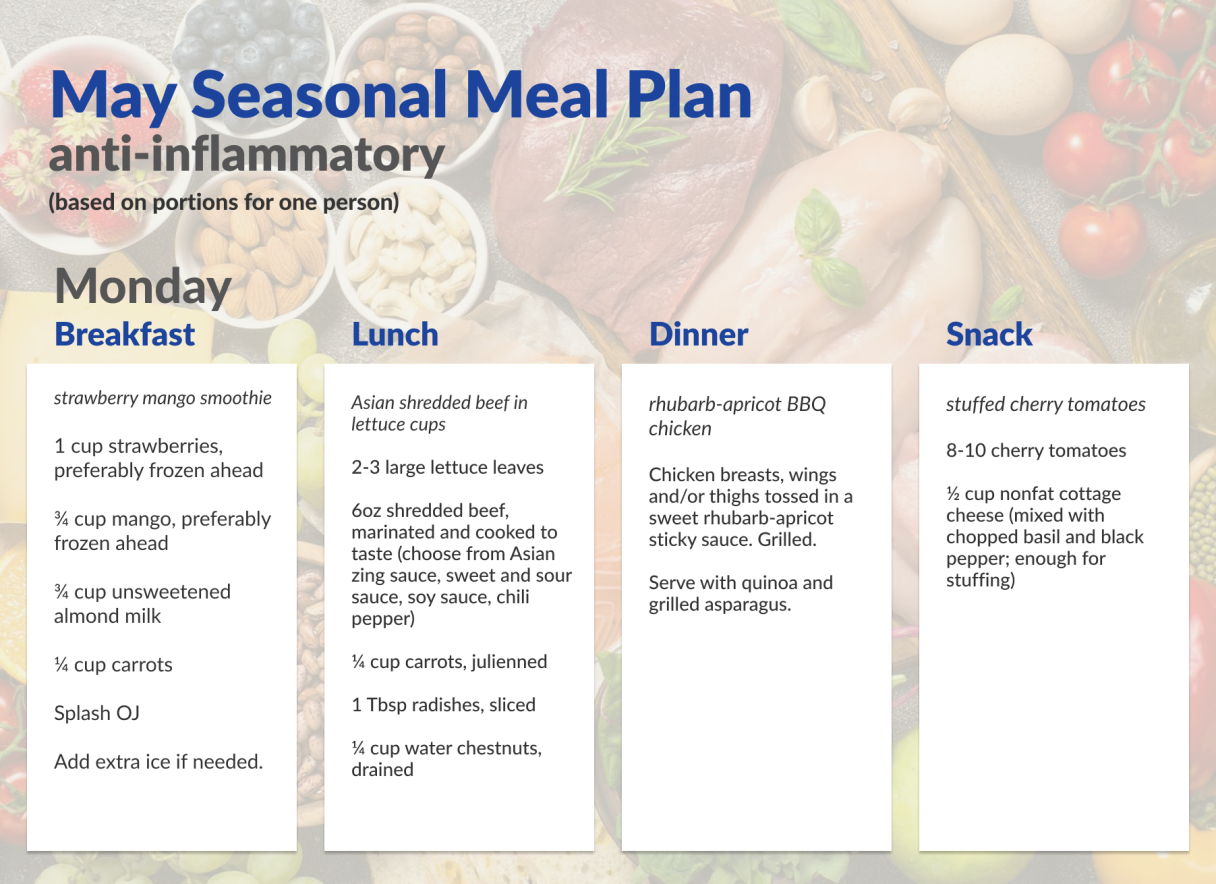
What are you waiting for? We’ve partnered with a Registered Dietician to create a whole week of anti-inflammatory meals designed to help reduce inflammation, support heart health and ease joint pain. The meal plan is full of mouth-watering breakfasts, lunches, dinners, and snacks that won’t trigger inflammation flare ups. Start your day off with a refreshing strawberry mango smoothie, or chow down on an aloha burger—a Hawaiian twist on the delicious turkey burger we know and love. And for snacks? Who doesn’t love dark chocolate or a rhubarb and apricot yogurt parfait?
For more healthy meal options, download our heart-friendly cookbook. It’s full of twelve additional healthy dinners that are delicious, easy, and fun to make. Or, for more ways to have fun while building heart healthy habits, sign up for our Healthy Heart Challenge. It's full of fun ways to boost the effects an anti-inflammatory diet can have on your overall health.
References
1 https://www.cdc.gov/chronicdisease/resources/publications/factsheets/arthritis.htm#:~:text=In%20the%20United%20States%2C%2024,form%20of%20arthritis%20is%20osteoarthritis.
2 https://www.nhlbi.nih.gov/news/2020/anti-inflammatory-diets-may-reduce-risk-cardiovascular-disease#:~:text=Anti%2Dinflammatory%20diets%20may%20reduce%20the%20risk%20of%20cardiovascular%20disease,-December%2023%2C%202020&text=A%20study%20in%20the%20Journal,the%20risk%20of%20cardiovascular%20disease.
3 https://www.arthritis.org/health-wellness/healthy-living/nutrition/anti-inflammatory/the-ultimate-arthritis-diet
4 https://www.health.harvard.edu/nutrition/an-anti-inflammatory-diet-may-be-good-for-your-joints
5 https://www.health.harvard.edu/staying-healthy/foods-that-fight-inflammation
6 https://www.fda.gov/food/consumers/advice-about-eating-fish#:~:text=Eat%202%20servings%20a%20week%20from%20the%20%E2%80%9CBest%20Choices%E2%80%9D%20list.&text=What%20about%20fish%20caught%20by,no%20other%20fish%20that%20week
7 https://health.clevelandclinic.org/is-red-meat-bad-for-you/#:~:text=Are%20there%20any%20health%20benefits,re%20eating%20and%20how%20often.
8 https://www.uchicagomedicine.org/forefront/gastrointestinal-articles/what-foods-cause-or-reduce-inflammation

